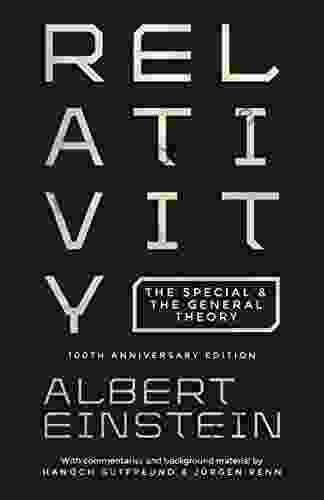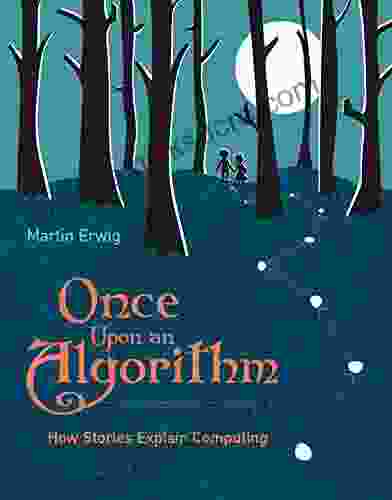Once Upon an Algorithm: How Stories Explain Computing

The Power of Storytelling
Stories have the power to captivate our imaginations, transport us to different worlds, and teach us valuable lessons. They are a powerful tool that can be used to explain even the most complex concepts in a way that is both engaging and easy to understand.
This is especially true when it comes to computing. Computing is a vast and complex field, but it can be difficult to explain its many concepts in a way that is accessible to everyone. This is where storytelling comes in.
4.5 out of 5
| Language | : | English |
| File size | : | 3488 KB |
| Text-to-Speech | : | Enabled |
| Screen Reader | : | Supported |
| Enhanced typesetting | : | Enabled |
| Word Wise | : | Enabled |
| Print length | : | 477 pages |
Algorithms in Everyday Life
One of the most important concepts in computing is the algorithm. An algorithm is a set of instructions that tells a computer how to perform a task. Algorithms are used in everything from search engines to social media to self-driving cars.
But what exactly is an algorithm? And how do they work? These are questions that can be difficult to answer in a straightforward way. But by using stories, we can make these concepts more relatable and easier to understand.
The Traveling Salesman Problem
For example, let's consider the traveling salesman problem. This is a classic problem in computer science that asks the following question: given a list of cities and the distances between them, what is the shortest possible route that a salesman can take to visit each city once and return to his starting point?
This is a complex problem that can be difficult to solve using traditional methods. But by using a story, we can make the problem more relatable and easier to understand.
Imagine a traveling salesman who is trying to visit 10 cities. He starts in New York City and needs to visit Boston, Philadelphia, Washington, D.C., Atlanta, Miami, New Orleans, Dallas, Denver, and Los Angeles before returning to New York City.
The salesman can visit the cities in any order, but he wants to find the shortest possible route. He could try to brute force the problem by trying every possible route, but this would take a very long time.
Instead, the salesman can use an algorithm to find the shortest possible route. One algorithm that he could use is the greedy algorithm. The greedy algorithm works by always choosing the next city that is closest to the current city.
Using the greedy algorithm, the salesman would visit the cities in the following order: New York City, Philadelphia, Washington, D.C., Atlanta, Miami, New Orleans, Dallas, Denver, Los Angeles, and New York City.
This route is not the shortest possible route, but it is a good approximation. The salesman could find a shorter route by using a more complex algorithm, but the greedy algorithm is a good starting point.
Artificial Intelligence and Storytelling
Stories are not just useful for explaining basic concepts in computing. They can also be used to explain more advanced concepts, such as artificial intelligence (AI).
AI is a branch of computer science that deals with the creation of intelligent agents. Intelligent agents are computer programs that can learn from their experiences and make decisions without human intervention.
AI is a complex and rapidly growing field, but it can be difficult to explain its many concepts in a way that is accessible to everyone. This is where storytelling comes in.
For example, let's consider the concept of machine learning. Machine learning is a type of AI that allows computers to learn from data without being explicitly programmed. This is a powerful technique that can be used for a variety of tasks, such as image recognition, natural language processing, and speech recognition.
But how does machine learning actually work? This is a question that can be difficult to answer in a straightforward way. But by using a story, we can make the concept more relatable and easier to understand.
Imagine a child learning to read. The child starts by learning the alphabet. Then, the child learns how to combine letters to form words. Finally, the child learns how to combine words to form sentences.
The child does not learn to read by being explicitly programmed. Instead, the child learns by observing the world around them and making inferences about how the written word works.
Machine learning works in a similar way. Machine learning algorithms learn by observing data and making inferences about the world around them. The more data that a machine learning algorithm sees, the better it will be able to learn.
The Benefits of Storytelling in Computing
Storytelling is a powerful tool that can be used to explain computing concepts in a way that is both engaging and easy to understand. Stories can help to make complex ideas more relatable, foster creativity, and promote a deeper appreciation for the field of computing.
Here are some of the benefits of using storytelling in computing education:
- Stories can help to make complex ideas more relatable. When students hear a story about a real-world problem that was solved using computing, they are more likely to understand the concepts involved.
- Stories can foster creativity. When students are asked to create their own stories about computing, they are forced to think creatively about the concepts involved. This can help them to develop a deeper understanding of the subject.
- Stories can promote a deeper appreciation for the field of computing. When students learn about the history of computing and the people who have made significant contributions to the field, they are more likely to develop a passion for the subject.
Storytelling is a powerful tool that can be used to explain computing concepts in a way that is both engaging and easy to understand. Stories can help to make complex ideas more relatable, foster creativity, and promote a deeper appreciation for the field of computing. As educators and researchers, we should continue to explore the use of storytelling in computing education.
4.5 out of 5
| Language | : | English |
| File size | : | 3488 KB |
| Text-to-Speech | : | Enabled |
| Screen Reader | : | Supported |
| Enhanced typesetting | : | Enabled |
| Word Wise | : | Enabled |
| Print length | : | 477 pages |
Do you want to contribute by writing guest posts on this blog?
Please contact us and send us a resume of previous articles that you have written.
 Fiction
Fiction Non Fiction
Non Fiction Romance
Romance Mystery
Mystery Thriller
Thriller SciFi
SciFi Fantasy
Fantasy Horror
Horror Biography
Biography Selfhelp
Selfhelp Business
Business History
History Classics
Classics Poetry
Poetry Childrens
Childrens Young Adult
Young Adult Educational
Educational Cooking
Cooking Travel
Travel Lifestyle
Lifestyle Spirituality
Spirituality Health
Health Fitness
Fitness Technology
Technology Science
Science Arts
Arts Crafts
Crafts DIY
DIY Gardening
Gardening Petcare
Petcare Al Desetta M A
Al Desetta M A Martin Luther King Jr
Martin Luther King Jr Nicholas Romanov
Nicholas Romanov Lingo Mastery
Lingo Mastery Nassim Nicholas Taleb
Nassim Nicholas Taleb Yang Jwing Ming
Yang Jwing Ming Paramahansa Yogananda
Paramahansa Yogananda Aphra Behn
Aphra Behn Elaine Howard Ecklund
Elaine Howard Ecklund Stephanie Izard
Stephanie Izard Amye Archer
Amye Archer Rand Cardwell
Rand Cardwell Gordon H Orians
Gordon H Orians Jacqueline Fitzpatrick
Jacqueline Fitzpatrick Amanda Ford
Amanda Ford Arnold Yates
Arnold Yates James Willard Schultz
James Willard Schultz Ken Denmead
Ken Denmead Mark Goulston
Mark Goulston Matthew Sturm
Matthew Sturm Jeanne Faulkner
Jeanne Faulkner Barbara Oehlberg
Barbara Oehlberg John J Miller
John J Miller Margaret J Wheatley
Margaret J Wheatley Bryan Mann
Bryan Mann Marcus Chown
Marcus Chown Gordon R Dickson
Gordon R Dickson Alastair Humphreys
Alastair Humphreys Steven Horak
Steven Horak Will Storr
Will Storr Dennis Jarecke
Dennis Jarecke Mike Warren
Mike Warren John Muir
John Muir Alan Booth
Alan Booth Gillian Gill
Gillian Gill Clyde Fitch
Clyde Fitch Andy Adams
Andy Adams Alan Hearnshaw
Alan Hearnshaw David Jason
David Jason Gayle Peterson
Gayle Peterson Cindy Hudson
Cindy Hudson G H Hardy
G H Hardy Hope Smith
Hope Smith Frances E Jensen
Frances E Jensen Mark Booth
Mark Booth Tim Gallagher
Tim Gallagher Charles J Thayer
Charles J Thayer Christopher Gavigan
Christopher Gavigan Donna Morang
Donna Morang Anne Enright
Anne Enright Habeeb Quadri
Habeeb Quadri Tenth Edition Revised Kindle Edition
Tenth Edition Revised Kindle Edition Jerry Robertson
Jerry Robertson Constance Classen
Constance Classen Wayne Stewart
Wayne Stewart Howard Hill
Howard Hill Peter Hathaway Capstick
Peter Hathaway Capstick Kiku Hughes
Kiku Hughes United States Government Us Marine Corps
United States Government Us Marine Corps Princess Her
Princess Her Antipodean Writer
Antipodean Writer Alaina Talboy
Alaina Talboy Steve Michalik
Steve Michalik Anna Hickey Moody
Anna Hickey Moody Bradley Efron
Bradley Efron Caitlin Zaloom
Caitlin Zaloom Dylan Alcott
Dylan Alcott Sara Hanover
Sara Hanover Larry Wasserman
Larry Wasserman Melissa Bashardoust
Melissa Bashardoust Jacqueline Tourville
Jacqueline Tourville Al Macy
Al Macy Linda Welters
Linda Welters Lexie Scott
Lexie Scott Andre Agassi
Andre Agassi Nancy Hughes
Nancy Hughes Jacob K Olupona
Jacob K Olupona S A Klopfenstein
S A Klopfenstein Anne Dachel
Anne Dachel Pavel Tsatsouline
Pavel Tsatsouline Carla Schroder
Carla Schroder Erin Ekins
Erin Ekins Gregory J Davenport
Gregory J Davenport Roy Dittmann
Roy Dittmann Sam J Fires
Sam J Fires Mista Nove
Mista Nove Original Edition Kindle Edition
Original Edition Kindle Edition Chris Klug
Chris Klug Patrick O Sullivan
Patrick O Sullivan Margit Ystanes
Margit Ystanes Janet Houser
Janet Houser Nina Lacour
Nina Lacour George Buehler
George Buehler Joyce Burkhalter Flueckiger
Joyce Burkhalter Flueckiger Alan Garner
Alan Garner J R Haseloff
J R Haseloff Lisa Kenney
Lisa Kenney David F Kelly
David F Kelly Jeremy Miles
Jeremy Miles John Leo
John Leo Al Marlowe
Al Marlowe Robert M Emerson
Robert M Emerson Julie Bradley
Julie Bradley Dorothy H Crawford
Dorothy H Crawford Katharine Graves
Katharine Graves Edupan7 Publishing
Edupan7 Publishing Collins Easy Learning
Collins Easy Learning Jonathan White
Jonathan White E A Koetting
E A Koetting Dr David Geier
Dr David Geier Brenda Nathan
Brenda Nathan Charlotte Markey
Charlotte Markey Al Pasha
Al Pasha Markus Rex
Markus Rex David King
David King E Cheng
E Cheng Bruce Lee
Bruce Lee Kareem Abdul Jabbar
Kareem Abdul Jabbar Jim Steenburgh
Jim Steenburgh Deborah Harkness
Deborah Harkness I Johnson
I Johnson Sara Wickham
Sara Wickham Steven Trimble
Steven Trimble Shing Tung Yau
Shing Tung Yau Jonathan Gottschall
Jonathan Gottschall Jordon Greene
Jordon Greene George Knudson
George Knudson Gill Rapley
Gill Rapley Meredith Marsh
Meredith Marsh Amelia Mayer
Amelia Mayer Donald Woods Winnicott
Donald Woods Winnicott Kristine Barnett
Kristine Barnett Tina Dreffin
Tina Dreffin Peter Ballingall
Peter Ballingall Nick Hughes
Nick Hughes Jacqueline Church Simonds
Jacqueline Church Simonds Jill Stamm
Jill Stamm Betsy Tobin
Betsy Tobin Rob Casey
Rob Casey Hiro Ainana
Hiro Ainana Satya Sundar Sethy
Satya Sundar Sethy Jon Tyson
Jon Tyson Sonia Nazario
Sonia Nazario Jackson Katz
Jackson Katz Gail Tully
Gail Tully Jill Homer
Jill Homer Akwaeke Emezi
Akwaeke Emezi Matt Mosher
Matt Mosher Massad Ayoob
Massad Ayoob Brandy Roon
Brandy Roon Arthur Fleischmann
Arthur Fleischmann Susan B Lovejoy
Susan B Lovejoy Dusty Rhodes
Dusty Rhodes Scott Surovich
Scott Surovich Vanessa Ogle
Vanessa Ogle Anahad O Connor
Anahad O Connor Dawn Sakamoto Paiva
Dawn Sakamoto Paiva Po Bronson
Po Bronson Timothy C Smith
Timothy C Smith Hannah Ewens
Hannah Ewens Alfred S Posamentier
Alfred S Posamentier Howard Greene
Howard Greene Molly Absolon
Molly Absolon Joe Bertagna
Joe Bertagna Bianca Smith
Bianca Smith David A Sousa
David A Sousa Graham Bower
Graham Bower Arnold Haultain
Arnold Haultain Charles B White
Charles B White Anders Halverson
Anders Halverson Mackenzi Lee
Mackenzi Lee Michael Freedland
Michael Freedland Saul Rip
Saul Rip Andy Zipser
Andy Zipser Erin Lovelace
Erin Lovelace Emeran Mayer
Emeran Mayer Benjamin Johnston
Benjamin Johnston George E Andrews
George E Andrews William Harding
William Harding Pantea Kalhor
Pantea Kalhor Joe Clement
Joe Clement James Gleick
James Gleick Juliet Marillier
Juliet Marillier Alan Shipnuck
Alan Shipnuck Alan Vermilye
Alan Vermilye Franz Metcalf
Franz Metcalf Joanne Webb
Joanne Webb Truman Everts
Truman Everts Alan Gelb
Alan Gelb Kevin Hunter
Kevin Hunter Elizabeth Thompson
Elizabeth Thompson Peter Irvine
Peter Irvine Ahmed Osman
Ahmed Osman Thomas Metzinger
Thomas Metzinger Jakob Tanner
Jakob Tanner Daphne Rose Kingma
Daphne Rose Kingma Nick Lyons
Nick Lyons Ann Hagedorn
Ann Hagedorn Kate Brian
Kate Brian Lee Carroll
Lee Carroll Terry L Duran
Terry L Duran Sir Edmund Hillary
Sir Edmund Hillary Sarah Hendrickx
Sarah Hendrickx Louis Schubert
Louis Schubert Eddy Starr Ancinas
Eddy Starr Ancinas John Feinstein
John Feinstein Rick Bass
Rick Bass William A Kaplin
William A Kaplin Esther Parry
Esther Parry Amy Edelstein
Amy Edelstein Robert Heidler
Robert Heidler Aja Raden
Aja Raden Isabella Morris
Isabella Morris Jeff Maynard
Jeff Maynard Percy Boomer
Percy Boomer Melinda Rushe
Melinda Rushe Lj Andrews
Lj Andrews Kardas Publishing
Kardas Publishing George M Fredrickson
George M Fredrickson Dave Whitson
Dave Whitson Zita West
Zita West Ilan Dvir
Ilan Dvir Ken Schultz
Ken Schultz Gina Guddat
Gina Guddat Thomas Kurz
Thomas Kurz Lisa Marasco
Lisa Marasco Alana Mclaren
Alana Mclaren Noel St Clair
Noel St Clair Len Sperry
Len Sperry Spencer Wells
Spencer Wells John Irving
John Irving Bill Walker
Bill Walker Rebecca Jones
Rebecca Jones Craig Childs
Craig Childs Alan Watts
Alan Watts Damon Lee
Damon Lee Alan Graham
Alan Graham Tom Shachtman
Tom Shachtman David Vine
David Vine Aileen Erin
Aileen Erin Andrea Travillian
Andrea Travillian Madeline Milne
Madeline Milne Martin Rooney
Martin Rooney Miles Mckenna
Miles Mckenna James Witts
James Witts Paul G Schempp
Paul G Schempp Gary Smith
Gary Smith Lisa Newton
Lisa Newton Jay Revell
Jay Revell Alan E Kazdin
Alan E Kazdin Matthew Mcbee
Matthew Mcbee Don Casey
Don Casey Joe Berardi
Joe Berardi Andrew Rowe
Andrew Rowe James F Boswell
James F Boswell Jenni Hicks
Jenni Hicks Rose Lynn Fisher
Rose Lynn Fisher Carol Tuttle
Carol Tuttle Gary Player
Gary Player Jerry Robeson
Jerry Robeson Douglas Noll
Douglas Noll Bryon Powell
Bryon Powell Mike Rothschild
Mike Rothschild Kelly Jensen
Kelly Jensen Alan Margot
Alan Margot Anthonissa Moger
Anthonissa Moger Dmitry Zinoviev
Dmitry Zinoviev Alex Light
Alex Light Alan C Acock
Alan C Acock Al Barkow
Al Barkow Douglas G Altman
Douglas G Altman Penney Peirce
Penney Peirce Kidada Jones
Kidada Jones Orson Scott Card
Orson Scott Card James A Michener
James A Michener Mariam N Ottimofiore
Mariam N Ottimofiore William Foote Whyte
William Foote Whyte R A Salvatore
R A Salvatore Judy Jewell
Judy Jewell Kiersten White
Kiersten White Christopher Hellman
Christopher Hellman Bobby Flay
Bobby Flay Robin Mckinley
Robin Mckinley Chris Vines
Chris Vines Jay Annelli
Jay Annelli Jessica Battilana
Jessica Battilana Jon Emmett
Jon Emmett Magnus Thollander
Magnus Thollander Theodore P Jorgensen
Theodore P Jorgensen Karen Levin Coburn
Karen Levin Coburn Vasilis Konstantinos Giontzis
Vasilis Konstantinos Giontzis Dave Heller
Dave Heller Conor Daly
Conor Daly Kerstin Gier
Kerstin Gier Natazha Raine O Connor
Natazha Raine O Connor Bob Mayer
Bob Mayer Mary Basick
Mary Basick Rebekah Sack
Rebekah Sack Dr Guy Leschziner
Dr Guy Leschziner Al Sweigart
Al Sweigart Alan Burdick
Alan Burdick David Crabtree
David Crabtree Judith Garrard
Judith Garrard Roxy And Ben Dawson
Roxy And Ben Dawson Amelia Simmons
Amelia Simmons Christopher Scordo
Christopher Scordo Bob Plott
Bob Plott Aidan Comerford
Aidan Comerford Aileen Evans
Aileen Evans Stephen M Camarata
Stephen M Camarata Michael Casey
Michael Casey John T Hansen
John T Hansen Terry Funk
Terry Funk Mykel Hawke
Mykel Hawke Bill Parisi
Bill Parisi Sandy Lindsey
Sandy Lindsey Albert Einstein
Albert Einstein Suze Guillaume
Suze Guillaume Samuel Carbaugh
Samuel Carbaugh Mel Thompson
Mel Thompson Marsha Wenig
Marsha Wenig Harriet Brown
Harriet Brown Alan E Sparks
Alan E Sparks Gavin Francis
Gavin Francis W E Fairbairn
W E Fairbairn Helena Clare
Helena Clare Leif K Karlsen
Leif K Karlsen Kim Stanley Robinson
Kim Stanley Robinson Vera Nazarian
Vera Nazarian Hervey Garrett Smith
Hervey Garrett Smith Micky Ward
Micky Ward Daniel C Okpara
Daniel C Okpara Steve Moore
Steve Moore Morgan Lyle
Morgan Lyle J Zoltan
J Zoltan Aimee Aristotelous
Aimee Aristotelous Megan Gray Md
Megan Gray Md Kai Nacke
Kai Nacke Thubten Chodron
Thubten Chodron Francesca Lia Block
Francesca Lia Block Aidan Chambers
Aidan Chambers Layla Moon
Layla Moon Michael Gray
Michael Gray Al Yellon
Al Yellon Cynthia Clumeck Muchnick
Cynthia Clumeck Muchnick Catherine Belknap
Catherine Belknap Harold Klemp
Harold Klemp Teresa Mccallum
Teresa Mccallum Peg Tyre
Peg Tyre Toby Wilkinson
Toby Wilkinson Terry Breverton
Terry Breverton Andrew Blum
Andrew Blum Al Roker
Al Roker Alan R Hall
Alan R Hall Belinda Luscombe
Belinda Luscombe Jane Poynter
Jane Poynter Laurie Pickard
Laurie Pickard 12th Edition Kindle Edition
12th Edition Kindle Edition Ai Publishing
Ai Publishing Alan Rouse
Alan Rouse Chris Bowers
Chris Bowers Edward A Tiryakian
Edward A Tiryakian Howard Maxwell
Howard Maxwell Robert L Kelly
Robert L Kelly Dimitri Loose
Dimitri Loose Farlex International
Farlex International Sophia Joy
Sophia Joy Ndeye Labadens
Ndeye Labadens Alan Porter
Alan Porter Linda G Morris
Linda G Morris Aiva Books
Aiva Books Tonya Johnston
Tonya Johnston George Monbiot
George Monbiot Jay Speight
Jay Speight Jan Smith
Jan Smith Dr Joseph Parent
Dr Joseph Parent Steven H Strogatz
Steven H Strogatz Robert A Sadowski
Robert A Sadowski Gary B Ferngren
Gary B Ferngren Contractor Education Inc
Contractor Education Inc S Connolly
S Connolly Emily Harris Adams
Emily Harris Adams George Plimpton
George Plimpton Al Owens
Al Owens The Rogue Hypnotist
The Rogue Hypnotist Douglas T Hall
Douglas T Hall Rehana Jawadwala
Rehana Jawadwala Rene D Zweig
Rene D Zweig Bill Friedrich
Bill Friedrich Eden O Neill
Eden O Neill Cat Warren
Cat Warren Courtney Macavinta
Courtney Macavinta Billy Walsh
Billy Walsh Michael Sidgwick
Michael Sidgwick Juno Roche
Juno Roche Alan S Gurman
Alan S Gurman G E R Lloyd
G E R Lloyd Shaun Tomson
Shaun Tomson Christos A Djonis
Christos A Djonis Gary R Varner
Gary R Varner Josh Kilmer Purcell
Josh Kilmer Purcell Marc M Triola
Marc M Triola Al Ristori
Al Ristori Jane Bottomley
Jane Bottomley Michael Shermer
Michael Shermer Pallas Snider
Pallas Snider Bettina Gordon Wayne
Bettina Gordon Wayne Mike Martin
Mike Martin Shoshana Levin Fox
Shoshana Levin Fox Skeleton Steve
Skeleton Steve Janice Selekman
Janice Selekman Ged Jenkins Omar
Ged Jenkins Omar David D Burns
David D Burns Dan Dipiro
Dan Dipiro M K Hume
M K Hume Michael Domican
Michael Domican Takuan Soho
Takuan Soho Dean Burnett
Dean Burnett Michael W King
Michael W King Jessica Cunsolo
Jessica Cunsolo Celeste Headlee
Celeste Headlee Nilakantasrinivasan J Neil
Nilakantasrinivasan J Neil Christopher Willard
Christopher Willard Olivia Gentile
Olivia Gentile Snap Summaries
Snap Summaries Robert E Stake
Robert E Stake Publishdrive Edition Kindle Edition
Publishdrive Edition Kindle Edition Erica Westly
Erica Westly Lo Bosworth
Lo Bosworth Richard Pears
Richard Pears Alan Murchison
Alan Murchison Denise Alvarado
Denise Alvarado Aidan Dodson
Aidan Dodson Tod E Bolsinger
Tod E Bolsinger Alan Lawrence Sitomer
Alan Lawrence Sitomer Jessica Cornwell
Jessica Cornwell Doug Gelbert
Doug Gelbert Martin J Pring
Martin J Pring Jamie Baulch
Jamie Baulch Alana Chernila
Alana Chernila We Fairbairn
We Fairbairn Florence Williams
Florence Williams Rosemarie Anderson
Rosemarie Anderson Kevin B Shearer
Kevin B Shearer Celeste Jones
Celeste Jones Kevin Williams
Kevin Williams Alan S Kaufman
Alan S Kaufman Noha Mellor
Noha Mellor Vernon Coleman
Vernon Coleman Andrew Jamieson
Andrew Jamieson Frank E Harrell Jr
Frank E Harrell Jr Samuel N Rosenberg
Samuel N Rosenberg Martin Erwig
Martin Erwig Angelina Wilson
Angelina Wilson Michal Stawicki
Michal Stawicki Clint Emerson
Clint Emerson Trevor Lund
Trevor Lund John Riley
John Riley Alice Oseman
Alice Oseman Alan Lightman
Alan Lightman Michael D Rich
Michael D Rich Lauren Blackwood
Lauren Blackwood Grace Lebow
Grace Lebow Michael Morpurgo
Michael Morpurgo Zondervan
Zondervan Taquetta Baker
Taquetta Baker Jack Nicklaus
Jack Nicklaus Kerry Diamond
Kerry Diamond Ainsley Arment
Ainsley Arment Bruce J Macfadden
Bruce J Macfadden Akil Palanisamy
Akil Palanisamy Ron L Deal
Ron L Deal Lex Croucher
Lex Croucher Mendocino Press
Mendocino Press John H Moore
John H Moore Aileen Nielsen
Aileen Nielsen Jay H Lefkowitch
Jay H Lefkowitch Sheila Barton
Sheila Barton Letisha Galloway
Letisha Galloway John Bird
John Bird Hammad Fozi
Hammad Fozi Mark Harris
Mark Harris Brian Mills
Brian Mills Helen Palmer
Helen Palmer Michael Miller
Michael Miller David Roberts
David Roberts Helen Hollick
Helen Hollick Deitra Leonard Lowdermilk
Deitra Leonard Lowdermilk Stephen Wolfram
Stephen Wolfram Alice Scordato
Alice Scordato Barbara Scott
Barbara Scott Jane P Gardner
Jane P Gardner Leigh Sales
Leigh Sales Lecile Harris
Lecile Harris Beata Bliss Lewis Md
Beata Bliss Lewis Md Carl Gustav Jung
Carl Gustav Jung Al Strachan
Al Strachan Vishwesh Bhatt
Vishwesh Bhatt Mark Occhilupo
Mark Occhilupo Timm Woods
Timm Woods Aitzaz Imtiaz
Aitzaz Imtiaz Mark Drolsbaugh
Mark Drolsbaugh Kate Bettison
Kate Bettison Robert Macfarlane
Robert Macfarlane
Light bulbAdvertise smarter! Our strategic ad space ensures maximum exposure. Reserve your spot today!

 Robbie CarterThe Legacy of Chernobyl: A Comprehensive Examination of the Catastrophe's...
Robbie CarterThe Legacy of Chernobyl: A Comprehensive Examination of the Catastrophe's... Raymond ParkerFollow ·16.2k
Raymond ParkerFollow ·16.2k Anthony BurgessFollow ·7.5k
Anthony BurgessFollow ·7.5k Aaron BrooksFollow ·19.1k
Aaron BrooksFollow ·19.1k Amir SimmonsFollow ·6.1k
Amir SimmonsFollow ·6.1k Greg CoxFollow ·19.1k
Greg CoxFollow ·19.1k Jesus MitchellFollow ·9.1k
Jesus MitchellFollow ·9.1k Grant HayesFollow ·19.8k
Grant HayesFollow ·19.8k George HayesFollow ·12.8k
George HayesFollow ·12.8k

 Deacon Bell
Deacon BellCompilation of Short Stories on Mental Illness and Ways...
Mental illness is a serious issue that affects...

 Jonathan Hayes
Jonathan HayesThe Practical Guide to Raising Courageous and...
As parents, we all want...

 Carlos Fuentes
Carlos FuentesA Journey to Remember: The High Sierra Love Story of...
Prologue: A Wilderness Encounter Beneath...

 Douglas Foster
Douglas FosterEndless Conquest: Embark on an Immersive Dungeon Crawl in...
Endless Conquest is a captivating LitRPG...

 Caleb Long
Caleb LongThe Special and the General Theory 100th Anniversary...
The year 2015 marks a...
4.5 out of 5
| Language | : | English |
| File size | : | 3488 KB |
| Text-to-Speech | : | Enabled |
| Screen Reader | : | Supported |
| Enhanced typesetting | : | Enabled |
| Word Wise | : | Enabled |
| Print length | : | 477 pages |












